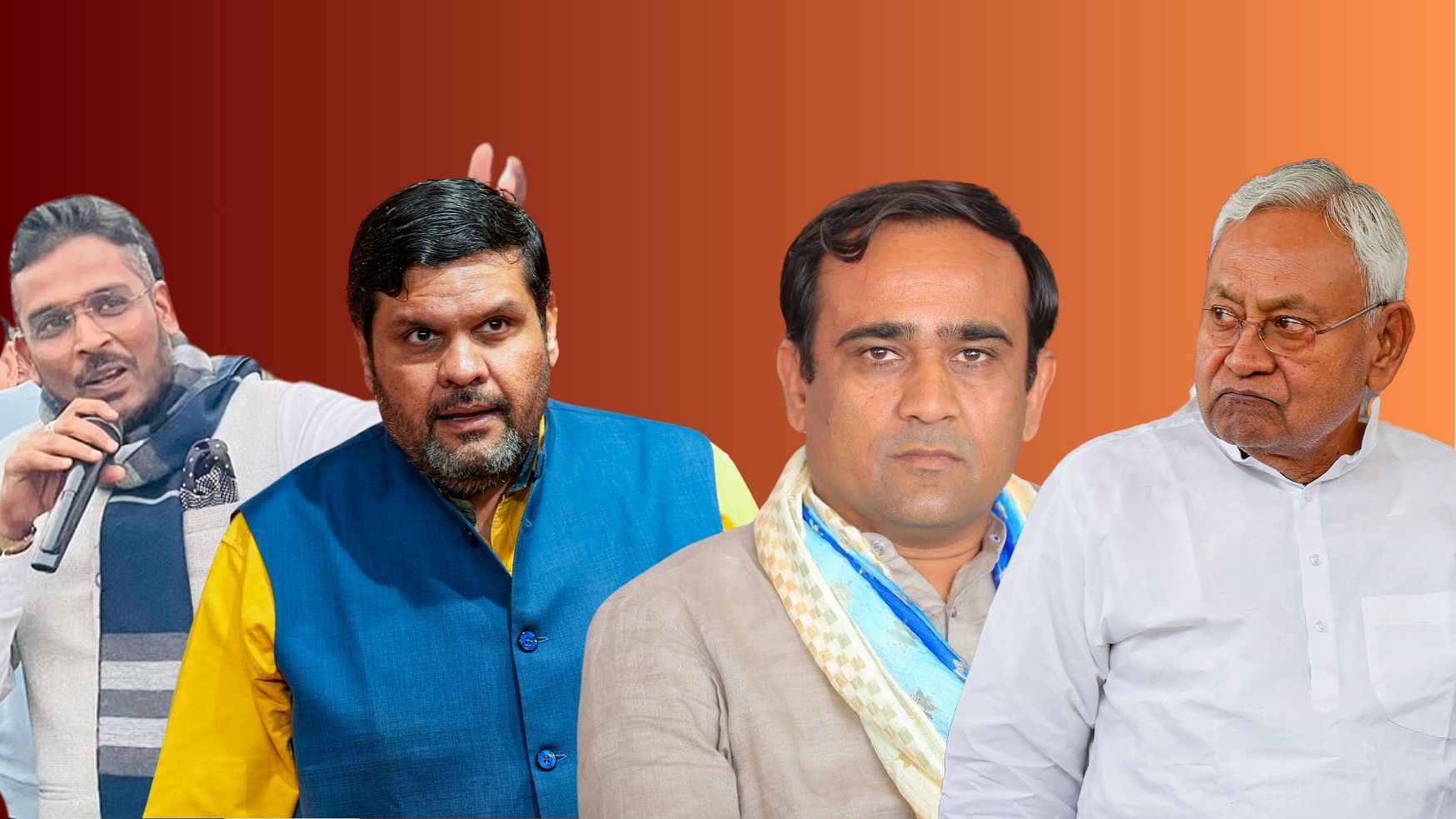
From left: Akshay Kanti Bam, Gaurav Vallabh, Nilesh Kumbhani and Nitish Kumar.
Credit: PTI, X/@NileshKumbhan10, X/@AkshayKantiBam
Defections when elections are underway subvert the purpose of the process of individual voters making a choice and arriving at a decision. Winning a seat without a single vote being cast as happened in Surat, Gujarat, raises a fundamental question about elections and democracy.
Elections are a verdict delivered by the voter. If the voter is made redundant to the process, then the legitimacy of elections is effectively destroyed. If elections are not fair and free and contested, then the health of democracy is probably in crisis.
Elections require two sets of actors: voters and candidates. The history of electoral politics has converted this process into a contest between competing political parties. A win without a contest snatches away from voters the right to freely express their choice. Voters in a walkover during elections become redundant to the process of reaching a judgement on the performance of the candidate and their party.
The explanation is necessary to put in perspective the strange goings on in Surat. On April 21, Congress candidate Nilesh Kumbhani’s nomination paper was rejected; predictably, the Congress called it dirty tricks. One candidate’s error, however, does not make for a walkover. It was only when eight other contestants withdrew their nominations and Mukesh Dalal of the Bharatiya Janata Party (BJP) was the only contestant left in the fray, that the process of electing turned into a fixed match with a winner who did not have to play at all.
Harvesting the history of elections, one report found that such walkovers are the rarest of rare events in India’s ferociously competitive politics. Dalal is the 22nd candidate to win without voter consent since the first election was held in 1951-1952. He is the BJP’s first candidate to have pulled off this feat.
Defections when elections are ongoing are equally problematic. A political person has the freedom to quit the party to which they belonged. A different political party is free to welcome the person into their fold. On April 29, the Congress candidate for the Indore seat, Akshay Kanti Bam, pulled out of the race, and joined the BJP. The signal he sent is loud and clear to his voters; the BJP is the best option. Since this move came days after a local Madhya Pradesh court issued directions to add murder charges against him in a 2007 land disputes case, the obvious inference is there is something fishy about this change of heart.
Voters have a decision to make in 2024. So does the Election Commission of India (ECI). Will they allow themselves to be taken for granted, railroaded into endorsing actions and giving them legitimacy? In Surat, the ECI can cite 21 precedents since 1951-1952 to say the process was kosher. In Indore, the ECI must take a call; the defection tilts the freedom and fairness of the electoral process in favour of one side, which is tantamount to undue influence and pressure tactics.
The popular sovereign, that is voters, have by and large become insensitive to defections, including co-ordinated en masse defections. The normalisation of defections in Indian politics since 2014 has installed new governments in various states, including Madhya Pradesh and Maharashtra, without the voters consenting to such a change because there was no election, and consequently no verdict.
Such co-ordinated defections that result in a coup of sorts, because one regime is overthrown and another comes to power, may be bloodless, but it does not follow that voters approve of such shenanigans. The 2024 Lokniti-Centre for the Study of Developing Societies (CSDS) pre-poll survey on a range of issues that may feed into voting preferences found that 46 per cent of voters thought defectors to the BJP were jumping ship to save their skins; these voters believed that people who defected did so to just protect themselves from central agencies such as the enforcement directorate and the CBI. Only 21 per cent of voters believed that defectors changed sides because they liked the BJP.
The survey findings imply that voters are either cynical or indifferent to the somersaults of political leaders, and that ideology is in a coma, making self-interest the driver for decisions made about political identity. The problem is the active promotion of such self-interest by the BJP that has accommodated defectors and been generous in handing out rewards to them. A significant 28 per cent of the candidates nominated by the BJP were from other parties, mostly the Congress, in the nine lists that were announced by early April.
This is not to argue that the BJP is the only habitual offender in the defection-reward nexus; the Congress and the Trinamool Congress (TMC) as well as other regional and smaller parties — except the Left — have been as welcoming and often generous. The fluidity in allegiances has blurred the lines dividing the right from the centre and the left: a case in point is Congress spokesperson Gaurav Vallabh’s switch on the plea he couldn’t bear to raise anti-Sanatan (Dharma) slogans, having fiercely attacked the BJP for its Hindutva politics reflects the new reality.
With five phases remaining, the popular sovereign must decide on backing the self-interest of a politician or protecting their interest by delivering a verdict that confirms their freedom to make a choice.
(Shikha Mukerjee Is a Kolkata-based senior journalist)
Disclaimer: The views expressed above are the author's own. They do not necessarily reflect the views of DH.